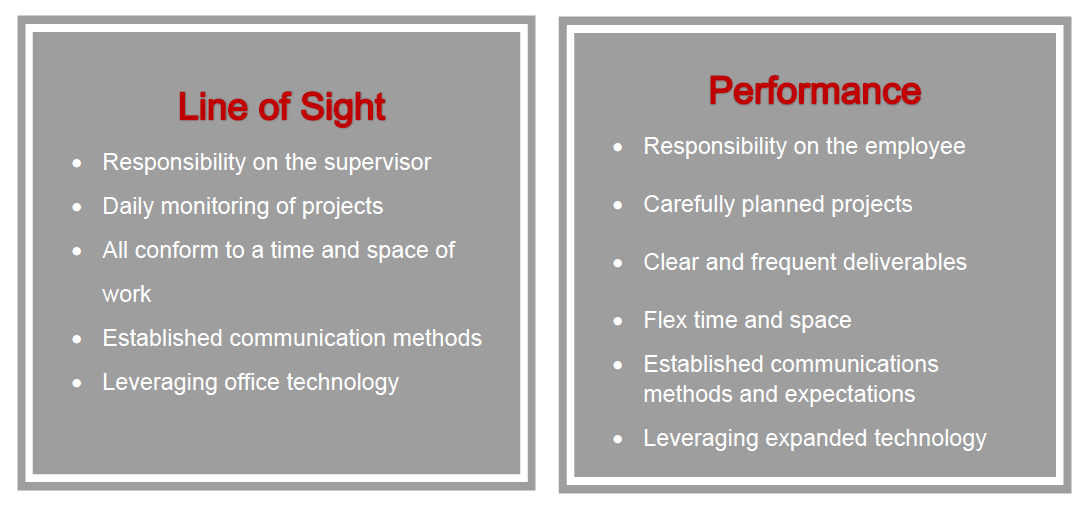Managing Remote Work
NJIT is committed to the strategic advantages of Remote Work Arrangements and we encourage and support managers in thinking creatively about how eligible staff can work remotely effectively.
It is the role of the Manager to create the conditions that allow your team to do their best work and to have the most job satisfaction possible. Vice Presidents, Deans and managers are empowered to make and implement decisions regarding flexible work arrangements for their department with VP/Dean approval. There will not be one solution that works for everyone.
Managers should determine which employees’ work dictates being in-person, which can be done remotely. We must stop thinking, "should an employee in a particular role be working on site or remotely"...and start thinking. "What type of work or tasks do employees do in their role, and where can those tasks be done most productively?" This guide can be used to help make these determinations.
A Leader's Guide to Developing a Flexible Work Strategy
- Shift your mindset of " where work is done" to "work is the outcomes of performance."
- "Where" is now a strategy on the best place to do tasks
- Develop an action plan
- Ensure open communication and dialogue
- Establish clear expectations
- Actively offer support to your team
- Be kind to yourself, change creates anxiety in humans
- Be flexible and adjust as needed
Inability to Observe Day-to-Day Workflows
- This inability can cause managers to ask " What does my employee do on a day-to-day basis and how do I know if they are working?" These questions exemplify the difference between a line-of-sight style of management vs performance-based management.
- Not being able to see employees everyday forces us, as leaders, to set strong performance expectations.
- Goals and expectations for work outcomes vs. measuring how long someone is “on the job”. This may be a new or different way of engaging with your team, but once perfected, it will help you to be highly effective.

Tips to Team Success
- Communicate Well
- Establish communication methods and expectations. Utilize chat messaging options and phone calls in addition to email and video conferencing.
- Schedule regular team meetings and individual check-ins.
- Avoid having partial virtual/partial in-person meetings as they are not as effective and may not support equity. Best policy is all-virtual or all-in person.
- Establish Clear Expectations
- Establish core hours where everyone is available and allows for meetings and collaboration. Be flexible with hours outside of core hours.
- Be flexible, but require a written schedule of hours, at least on a weekly basis to allow for changing circumstances.
- Schedule regular check-ins with your staff to ensure they have the information they need, have work assigned to them, and are able to reach you for any questions and/or guidance.
- Work with individual team members to agree to specific guidelines around key work outputs, ensuring input and clarity.
- Support Your Team
- Make sure your team has the tools they need to do their work effectively and comfortably.
- Check in frequently with your individual staff members. Monitor their well-being.
- Lead equitably by responding to each person's unique circumstances and needs.
- Be positive and trust employees will work productively
- Trust is at the heart of every relationship, and it’s especially critical in the workplace. In fact, the primary factor affecting employee turnover is whether or not there is a trusting relationship between a manager and their employees. Trust is critical for engagement, creativity, and commitment, and therefore is something we must foster.
- Recognize that people want to succeed at work and at life. Assume good intent. Allow space for exploration so your team members can find their most productive methods of remote work.
- Instead of focusing on how many hours your employees are working, re-emphasize a focus on measuring results and reaching objectives—regardless of work arrangement. The employee’s completed work product is the indicator of success, rather than direct observation.
- Develop your Team
- Utilize change as an opportunity to encourage additional professional development in your team. Speak with each employee and together decide what classes might be helpful or of interest to help them. Consider exploring work optimization skills to better manage the work-from-home experience.